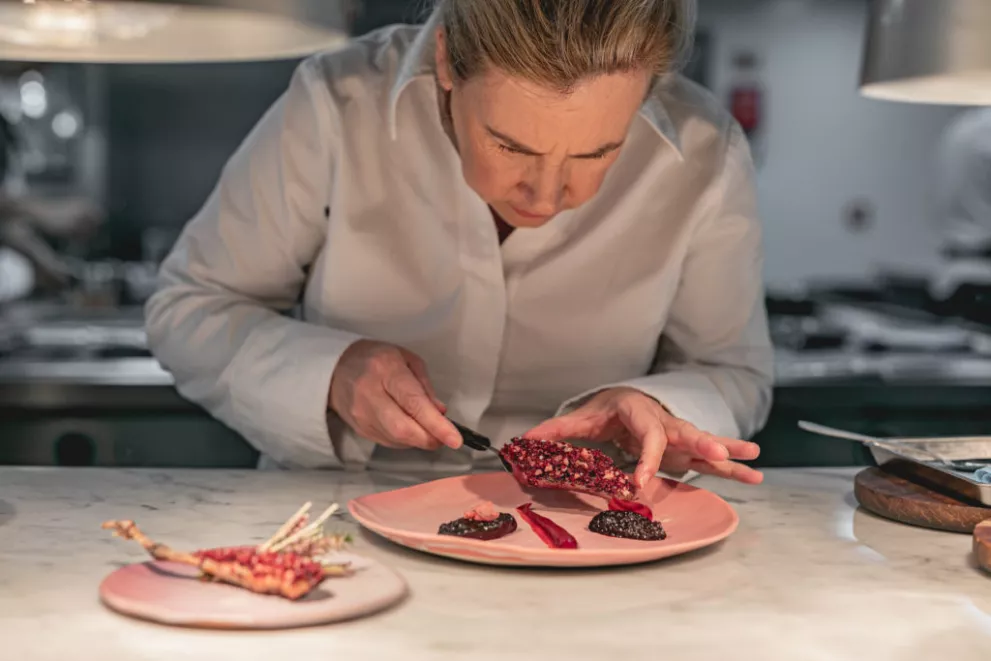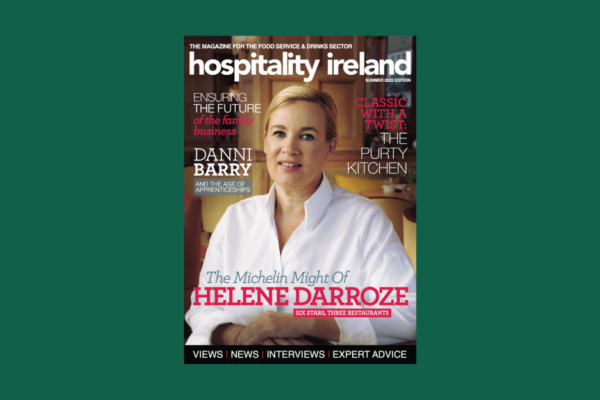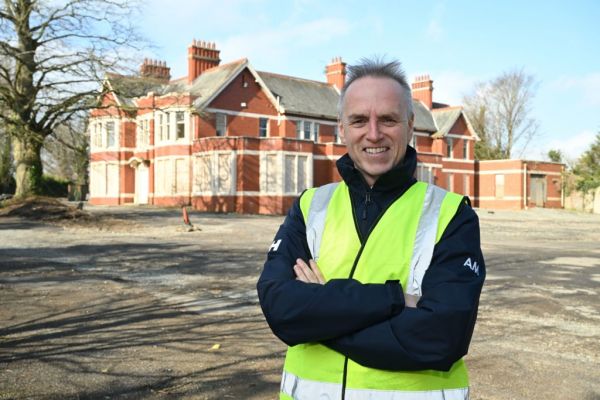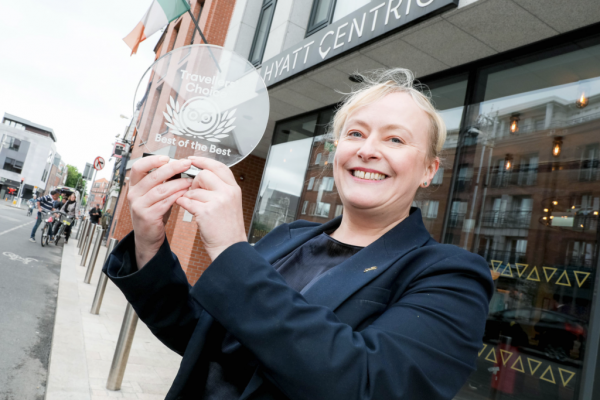Chef Hélène Darroze has a total of six Michelin stars and three restaurants: Hélène Darroze at the Connaught, in London, with three stars; Marsan par Hélène Darroze, in Paris, with two stars; and Hélène Darroze à Villa La Coste, in Provence, with one star. She lives in Paris with her two daughters. Here, she talks to Hospitality Ireland about becoming a chef, working in a changing industry, and balancing her life outside it.
This article was originally published in the Summer 2022 issue of Hospitality Ireland Magazine, in July of 2022.
Hélène, your career has been astonishing. It’s particularly amazing to see a woman – and I know that we shouldn’t still be saying this, but it is still the reality that it is much more difficult if you are a woman to achieve what you have, so just talk me through where your interest in food comes from and how you’ve made such a stellar career out of it.
My interest in food came from my childhood. I was born in a country where cooking and welcoming people around the table is – I will say in French – joie de vivre. I love to spend time giving pleasure to others through food. That came from my roots, from my family, from my education – probably a little bit in my DNA also. My father and my uncles were chefs. My grandfather, grandmother, great-grandfather, -grandmother all cooked, so, for sure, it comes from there.
Did you always think that it would be the career for you?
No, I never thought that I would be a chef. I graduated in the middle of the 1980s, and, you know, when you are the student, it’s not in the mentality to be a chef. You think you have to study, to go to university, and – particularly when you are a woman – it’s not also in the mentality to be a chef.
So, it was perhaps stupid, but I studied in business school, and it was not at all the plan to be a chef. Of course, I wanted to work in the industry – in hotels, restaurants, etc. – but more at the management level. Luckily, I met Alain Ducasse and worked with him in his office, and he was the one who said to me, “You have a passion. You are good at this. Please go in the kitchen and cook.”
When you began to do that, was it a question of instantly realising, this is what I want to do, this is where my passion is?
Yeah – straight away. I knew that it was my passion before I knew that I knew. I had spent a lot of time in the kitchen of the family hotel, the family restaurant, so I knew that I loved it. I started to cook when I was very young and I never stopped, so I knew it was my passion. I just didn’t know it was my career, but, straight away, I embraced that. Once I made the decision, I embraced it with a lot of passion and love.

We talk a lot, still, about the culture of kitchens – the hours, which can be terrible. Did any of that make you think twice about making it a career?
When I announced that I would do this to my dad, I remember that he was very happy, but he also told me, “Just realise something: you will work when the others will have fun, and it’s not easy, every day, to do that.” That’s what he told me. I don’t know if I realised, at the time, when he said that to me, but what I can say is that, so far, I’ve never regretted my decision.
How did the Connaught come about – the meeting with Gordon Ramsay and the move to London?
The owners came to see me. They heard about me, I suppose, and they came to see me. It was a friend of mine – a French actress – who had dinner with one of the owners, and she put us in contact. At first, I didn’t realise what the Connaught was. Then I had a look – just out of curiosity – and at the end I really fell in love with it. It was not the best timing for me because I just had my baby, but it was OK.
How does it work logistically for you, between the different restaurants?
I try to spend the same time between the fine dining in Paris and the fine dining in London. I live in Paris now. At the beginning, I lived in London, but, for many reasons, I came back to Paris. So, I try to spend the same amount of time at Marsan – the fine-dining restaurant in Paris – and at the Connaught, and then after, I go to Provence, to the Villa La Coste, once a month for a few days. I travel a lot, but it’s important for me to find the balance between Paris, Provence and London.
Describe the ethos of the way you cook and the restaurants.
In the end, the three of them are very different. The three fine-dining restaurants have the same value. They have the same work, in the same spirit, which is about authenticity, respect, respect of taste, respect of the product. It’s about creativity, and, of course, it’s about generosity – and now it’s also about sustainability because I really think that we have a responsibility.
In Provence, we work with products from Provence, so I can say that 90% of the products are from Provence. For the vegetables, we have gardens around the restaurant. We also have a local producer producing amazing vegetables and fruits. It’s not that it’s vegetarian, but we work around the vegetables – and the protein, it comes almost as a garnish. We try to use all the parts of the vegetable, so as not to lose anything. We also work completely with the seasons.
In Paris, it’s more about my roots – what I learned from this country, what I learned from my family. It’s the core, if you like – it’s the soul of what I do everywhere. A lot of my produce comes from the south-west and from around Paris – from local producers around Paris.
In London, first and foremost, I am in a hotel. I work with the clientele from the hotel – which is an amazing hotel – in mind. Perhaps it’s a little bit more elaborate. On the plate, it’s very clean and [pitched] at the level of the international clientele. It’s more conceptual. Of course, I try to use, as much as possible, products from the UK. It’s not possible all the time, particularly with the vegetables, but I try to do it.

Hélène Darroze at The Connaught
In the time that you have been working in this industry, what changes have you seen? Have you seen positive changes, or have you seen less positive changes in the way that the industry is structured? How is it to work within that?
I think there have been a lot of big changes, and in a very positive way. One of the changes that is completely necessary is what I said before: it’s our responsibility to work with sustainability.
I think that now everybody realises that we have to work with this more than ever – with the seasons, with local food. We have to encourage local producers and support them, so I really think that, during the last ten years, everybody – well, not everybody, unfortunately – but most chefs understood that and work in this way, and that’s a very, very positive way.
There is the sentence, ‘We are what we eat,’ and we have to live this point of view. We have to be an example. We have to show the way. The way of cooking has changed a lot during the last few years because of that. There is also a big change, which was necessary, regarding the balance between the times that people in our industry spend in the kitchen and on the floor, and in their personal life.
I’m a bit worried, though, because it’s so difficult to find people who want to work when the others have fun – to use the quote from my dad – but we have to find the balance because we realised that it was completely unbalanced. Finding the balance is a big change, and sometimes I worry that – someday soon – on a Sunday, all restaurants will be closed. We have to find some way to avoid that.
Of course, expectations have changed. They are far more global. If I compare now with ten years or 20 years ago, you really see the changes. Now you can find in London the best of Japanese food, the best of Chinese food. That is a big change. I also see the change in Paris because Paris was very late to that. Paris was very focused on French cuisine, and not really open to other cuisines. Now we have changed a lot [in that regard], so it’s also something interesting, for sure, but I regret, sometimes, that we seem to be forgetting local food.
Again, it’s a balance.
Yes – balance. It’s a little bit of a shame that we can now eat the same thing everywhere we go.
We’re beginning to see a lot of incredibly talented women coming into the industry and coming through the industry now. Is it a little bit easier to be a woman in the industry now?
A bit – but just a little bit. I have been pessimistic on this point, and, unfortunately, I could say that I was right because, yes, there are a few more, for sure, but it is not easy.
I have never had the feeling that men closed doors against me. That hasn’t been true for me – I cannot say that at all – but what I can see in my career is that sometimes you have a choice to make, and sometimes it’s not an easy choice. I don’t want to speak about sacrifice because, for me, it has never been sacrifice – I never say I have sacrificed anything – but there are choices to make [that involve career and family], and it’s not easy, sometimes, to make them.
It’s hard to see what can be different. Do you think about what could be different? What would make this career more possible for women?
I think it’s more in the mentality than anything else. You just have to understand – it’s another life. It’s not the usual routine of a woman, but you can find your happiness in that also.

Hélène Darroze at The Connaught. Photo by Jérôme Galland
What are the major challenges in the industry at the moment? Certainly in Ireland, staff is a massive problem. Is that the same for you?
It’s the same everywhere, but perhaps more difficult now in the UK because of Brexit. That’s certainly a big problem. We have been looking for an executive pastry chef here at the Connaught for months. We found one – from a European country – and tried to get a visa for him. Last week he had an English test to do – I can assure you that his English was good because, before the interview, he came to do a trial here – but he failed the test because it was so difficult that I don’t even know if I could have passed it. So, that’s the biggest issue at the moment.
Let’s talk about Covid and how it changed things. Do you think that Covid has had an effect on the industry, or not as much as we think?
On staff, for sure – they came back with another mentality, another point of view – and so, even though I think governments should help us to find our team, even with that, I’m not sure we will be able to find people.
Covid and lockdown had a big impact on people’s attitudes, but they also had a big impact on our clients because they came back knowing that they wanted to enjoy, to experience, and that was very positive.
What are your hobbies? Do you have time for anything outside work and family, and if so, what do you do?
I try to find time. My children are 13 and 15, and it’s important to try to be with them now. I have a rule: when they are on holiday, I try to take half the time of their holiday off – weekends and half the holidays, I try to spend with them. We do things together. One of my girls is passionate about fashion, so one week we might go to see the design exhibition – things like that that we can share.
We travel. We love travelling and discovering other cultures, other food. I love travelling, but I don’t do it enough. Then I love reading, listening to music, but even reading and taking exercise is a little bit challenging when you finish at eleven o’clock.
Finally, do you have any plans for the next six months to a year?
During the pandemic in Paris, we did a lot of takeaway – particularly burgers – which was really successful, so, in October, we will open our first burger restaurant in Paris.
That’s an interesting new departure.
Yes – completely different, but a lot of fun.
Read More: Hospitality Ireland Summer 2022: Read The Latest Issue Online!








